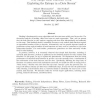387 search results - page 32 / 78 » Many Random Walks Are Faster Than One |
SODA
2008
ACM
13 years 10 months ago
2008
ACM
Hashing is fundamental to many algorithms and data structures widely used in practice. For theoretical analysis of hashing, there have been two main approaches. First, one can ass...
FPGA
2000
ACM
14 years 20 days ago
2000
ACM
A method for evaluating and constructing sparse crossbars which are both area efficient and highly routable is presented. The evaluation method uses a network flow algorithm to ac...
CORR
2011
Springer
13 years 4 months ago
2011
Springer
Abstract—Breadth First Search (BFS) is a widely used approach for sampling large unknown Internet topologies. Its main advantage over random walks and other exploration technique...
ICML
2008
IEEE
14 years 9 months ago
2008
IEEE
In many applications, data appear with a huge number of instances as well as features. Linear Support Vector Machines (SVM) is one of the most popular tools to deal with such larg...
INFOCOM
2003
IEEE
14 years 2 months ago
2003
IEEE
Abstract— This work presents a thorough investigation of the structure of multicast trees cut from the Internet and power-law topologies. Based on both generated topologies and r...

